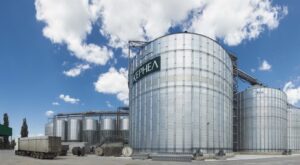
Kernel, one of the largest Ukrainian agro-industrial groups, will not pay dividends for FY2022 (FY, July-2021-June-2022) due to the net loss of $41.1 mln incurred by the holding for the period.
According to the company’s announcement on the Warsaw Stock Exchange Tuesday night, the decision was made by the holding company’s shareholders at a meeting on Dec. 2022.
“Kernel Holding S.A. announces its annual general meeting of shareholders on Dec. 20, 2022, at which it declared a zero dividend for the fiscal year ended June 30, 2022,” the group said in a stock exchange statement.
“Kernel was the world’s number one producer of sunflower oil before the war (about 7% of world production) and its exports (about 12%), and was the largest producer and seller of bottled sunflower oil in Ukraine. In addition, the company was engaged in cultivation of other agricultural products and their realization.
The largest co-owner of Kernel, through Namsen Ltd. is Ukrainian businessman Andrei Verevskyi, with a 39.3% stake.
In FY2022 (July-2021 – June-2022), the holding posted net loss of $41 mln against $506 mln net profit in the previous FY. Its revenue decreased by 5% – to $5.332 bln, while EBITDA decreased 3.7 times – to $220 mln.
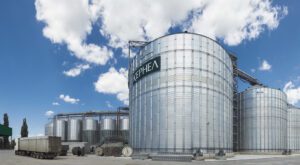
On December 12, companies related to the managers of Kernel agro-industrial group bought Eurobonds of the holding with a total par value of $12.4 mln at a price of 45-46% of the nominal value, Kernel said in a statement on the Warsaw Stock Exchange on Monday evening.
According to it, there were four transactions with Eurobonds maturing in 2024 and a coupon of 6.5% per annum: par value of $2.4 million at 45.75% of par value, par value of $2.5 million (at 46%), par value of $5 million (at 45%), par value of $2.5 million (at 45.55%).
It is specified in the message that deals were made at over-the-counter market.
As earlier reported, in the middle of November the companies, related to “Kernel” management, purchased Eurobonds of the holding with a total par value of $29,43 mln at a price of 45-48% of the nominal value.
According to the annual report of “Kernel” in the middle of this year in the market were eurobonds of the company with maturity in 2024 and the nominal value of $297,314 million with maturity in 2027 and $297,724 million.
“Kernel was the world’s number one producer and exporter of sunflower oil before the war (about 7% of world production) and the largest producer and seller of bottled sunflower oil in Ukraine. In addition, the company was engaged in cultivation of other agricultural products and their realization.
The largest co-owner of Kernel, through Namsen Ltd. is Ukrainian businessman Andrei Verevskyi, with a 39.3% stake.
In FY2022 (July-2021 – June-2022), the holding posted net loss of $41 mln against $506 mln net profit in the previous FY. Its revenue decreased by 5% – to $5.332 bln, while EBITDA decreased 3.7 times – to $220 mln.
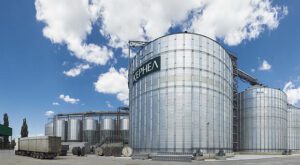
The agro-industrial group Kernel is negotiating with its creditors to defer the repayment of debt obligations that have grown to a record high since the beginning of the Russian military invasion of Ukraine – up to $1.95 billion as of June 30, 2022, which is 37% more than its amount as of the same date in 2021 of the year.
According to a financial report on the holding’s website on Wednesday night, this increase in debt was mainly due to a sharp increase in short-term debt raised to replenish working capital in the winter of 2021-2022 and outstanding by the summer of 2022 due to Russian aggression and related with it negative factors.
According to the group of companies, its net debt obligations by June 30, 2022 increased by 1.8 times compared to the same date last year – to $ 1.49 billion, and the ratio of debt to EBITDA jumped to a record five-year ratio of 6.8x compared to 1.0x in 2021.
“The Russian invasion began just at the peak of our working capital cycle, when we had the highest seasonal debt level of $1.95 billion in the history of the company and an all-time high inventory of $0.9 billion. Fortunately, we entered into this is a turbulent time in a relatively good financial condition, so we continued to service our debt, but we were forced to negotiate a deferral of repayment of the principal debt to creditors,” the holding said in a statement.
Kernel recalled that the first such negotiations allowed it to defer the repayment of the principal amount of the debt until September 30, 2022, and now it is negotiating to extend the delay until June 30, 2023.
“As of the day of this report, we received refusals to extend the maturity of the principal debt in the amount of $627 million with creditors until June 30, 2023. For debt obligations totaling $246 million, we are in the process of issuing such refusals,” the holding emphasized in the report .
Kernel specified that in December 2021 it completed the early redemption of Eurobonds for $213 million, reducing the total amount of Eurobonds maturing in 2022 to $595 million.
“Due to the fact that the group did not have an unconditional right to defer settlements of 12 months or more in relation to its banking services as at June 30, 2022, $198 million of long-term bank loan balances and $595 million of Eurobonds outstanding were reclassified as short-term as of June 30, 2022,” the holding said in a statement.
Also, according to him, by June 30, 2022, Kernel pledged 370,000 government bonds of Ukraine in the amount of $6.08 million as collateral for previously taken short-term loans.
“While we have completed one of the most difficult periods in our history, the prospects for the future remain unclear and will greatly depend on the outcome of the war in Ukraine and the group’s ability to export agricultural products through the Black Sea ports of Ukraine,” the holding stated.
Before the war, Kernel ranked first in the world in the production of sunflower oil (about 7% of world production) and its export (about 12%), and was also the largest producer and seller of bottled sunflower oil in Ukraine. In addition, the company was engaged in the cultivation of other agricultural products and their sale.
The largest co-owner of Kernel through Namsen Ltd. is Ukrainian businessman Andrey Verevsky with a share of 39.3%.
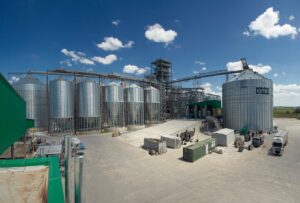
Agro-industrial group Kernel, the largest producer of vegetable oil in Ukraine, will publish its consolidated report for the 2022 financial year (FY, July-2021 – June-2022) on November 10 instead of the previously scheduled date of October 28.
As indicated in the message of the holding on the Warsaw Stock Exchange on Wednesday, the postponement was caused by the collection of additional information about the consequences of Russian aggression in Ukraine.
It is specified that on the day of the publication of the report, the management of Kernel will not hold a regular telephone conference, since “no information in addition to that published in the report should be presented during such a conference.”
“The management does not intend to make any recommendations or forecasts regarding the future activities of the company, given the uncertainty prevailing in Ukraine due to the Russian invasion. The company will return to the usual practice of arranging quarterly calls after the lifting of martial law in Ukraine,” the agricultural holding emphasized in an exchange message. .
In addition, the group of companies will continue to analyze the consequences of Russian aggression in Ukraine and inform all parties interested in the company’s activities about updates and changes in the work of Kernel.
Before the war, Kernel ranked first in the world in the production of sunflower oil (about 7% of world production) and its export (about 12%), and was also the largest producer and seller of bottled sunflower oil in Ukraine. In addition, the company was engaged in the cultivation of other agricultural products and their sale.
The largest co-owner of Kernel through Namsen Ltd. is Ukrainian businessman Andrey Verevsky with a share of 39.3%.
The agricultural holding in fiscal year 2021 (FY, July 2020 – June 2021), increased its net profit by 4.3 times compared to FY 2020 – up to $513 million, its EBITDA increased 2.1 times – up to $929 million, revenue – by 38%, to $5.65 billion.

Agro-industrial group “Kernel”, the largest producer of vegetable oil in Ukraine, will publish a consolidated report for fiscal year 2022 (FY, July-2021 – June-2022) on October 31, 2022 due to the unstable situation in Ukraine in the context of the Russian invasion.
As stated in the message of the holding on the Warsaw Stock Exchange, the management of Kernel in this fiscal year will not hold a regular conference call on the day the report is published, since “no information in addition to that presented in the report should be presented during such a conference.”
“The management does not intend to make any recommendations or forecasts regarding the future activities of the company, given the uncertainty prevailing in Ukraine due to the Russian invasion. The company will return to the usual practice of arranging quarterly calls after the lifting of martial law in Ukraine,” the agricultural holding emphasized in an exchange message. .
In addition, the group of companies will continue to analyze the consequences of Russian aggression in Ukraine and inform all parties interested in the company’s activities about updates and changes in the work of Kernel.
Before the war, Kernel ranked first in the world in the production of sunflower oil (about 7% of world production) and its export (about 12%), and was also the largest producer and seller of bottled sunflower oil in Ukraine. In addition, the company was engaged in the cultivation of other agricultural products and their sale.
The largest co-owner of Kernel through Namsen Ltd. is Ukrainian businessman Andrey Verevsky with a share of 39.3%.
The agricultural holding in fiscal year 2021 (FY, July 2020 – June 2021), increased its net profit by 4.3 times compared to FY 2020 – up to $513 million, its EBITDA increased 2.1 times – up to $929 million, revenue – by 38%, to $5.65 billion.
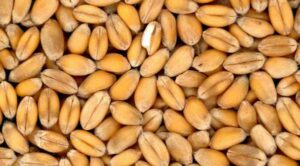
Agroindustrial holding “Kernel” has completed the harvesting campaign of early grains in 2022, having collected, according to the calculations of the Interfax-Ukraine agency, at least 364 thousand tons of winter wheat.
As reported on the holding’s Facebook page on Monday, the winter wheat crop was harvested from an area of more than 70,000 hectares with a yield of 5.2 tons/ha.
At the same time, it is specified that the harvesting of early grains and rapeseed was completed before the end of August, despite adverse weather conditions.
“The sowing and harvesting campaigns were complicated by the military situation and weather conditions. Due to precipitation, grain harvesting continued for almost 40 days. Prolonged rains in some regions led to a deterioration in the quality indicators of the grown grain,” explained Igor Chikin, director of the Agribusiness segment, quoted by the press agricultural holding service.
According to him, the agro-industrial group experienced major organizational difficulties in the spring during the Russian large-scale invasion, when the holding was unable to grow winter crops according to the required technology. However, subsequently Kernel managed to optimize the technology and costs, carry out top dressing and protection of crops, thanks to which it was possible to get a good harvest.
The agricultural holding specified that the yield of winter rapeseed in the current season reached 3.4 tons/ha, varying between 2.8-3.7 tons/ha.
Before the war, Kernel ranked first in the world in the production of sunflower oil (about 7% of world production) and its export (about 12%), and was also the largest producer and seller of bottled sunflower oil in Ukraine. In addition, the company was engaged in the cultivation of other agricultural products and their sale.
The largest co-owner of Kernel through Namsen Ltd. is Ukrainian businessman Andrey Verevsky with a share of 39.3%.
The agricultural holding in fiscal year 2021 (FY, July 2020 – June 2021), increased its net profit by 4.3 times compared to FY 2020 – up to $513 million, its EBITDA increased 2.1 times – up to $929 million, revenue – by 38%, to $5.65 billion.